Launch! - The Lev Diary
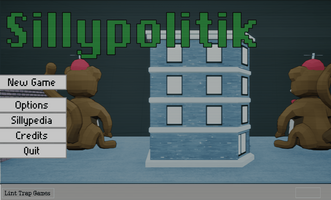
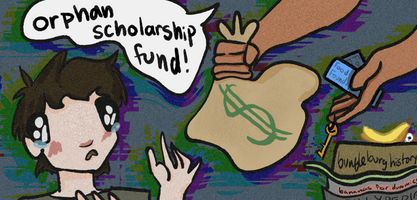
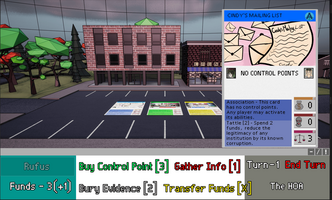
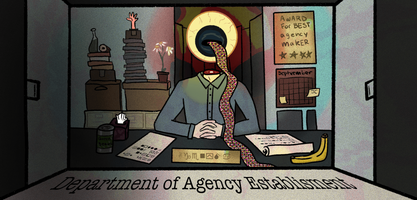
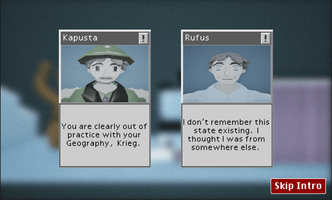
The Design and Development of Sillypolitik
I can’t believe we’re here! Sillypolitik has been in development for about 8 months, and we’re finally at the release date. I’m very proud of the team, who have excelled in every department; everything from the game UX and programming to the 2D and 3D art far outclass what I expected on a student project. This Dev Diary will focus on the creative vision and design elements of the game, but I will see if I can badger anyone else into writing one of these.
The Idea
Sillypolitik started out as an idea kicking around in my head in the summer of 2023: I wanted to develop a political simulation game that let you pit rival parts of government against each other. I whipped up a crude prototype in Unity, of which nothing remains except this interesting screenshot:
Do forgive the lack of pixels, I don’t even know where this file is on my computer any more, and my stupid rip-off powerpoint wouldn’t let me download the image from my presentation.
I knew from the beginning I wanted a retro surrealist aesthetic, with that Metal Gear feeling of a character talking in the corner of the screen flipping between frames of an open and closed mouth as they yell gibberish at you. The characters of Rufus Krieg, General Kapusta, the Mayor, and the Chancellor were all also on my mind at that point, but I didn’t have a story fully planned out by then. The style we landed on is a bit more 90s than the original premise, but there was a world where we stuck with that original direction. That Sillypolitk may have looked more like this:
I know a Guy or seven
In August of 2024, I took Game Dev practicum, a Purdue course that boils down to get a team and go make a video game. Prior to the class, I wrote up a basic Game Design Document and pitched the idea to my friend Mack, and he signed on. Together, we shared the game concept with the class on day one. Evidently, the concept resonated with people, or at least the fact that we had an idea at all did. We had so many people interested in the project that we started turning people away, as Mack and I had both had bad experiences with student projects that got too large in size. I think Anna was one of the first people on board. Having worked on a traumatically awful lava parkour level with her (I will pay anyone handsomely to remove it from the internet forever), and having shared a few classes, I was happy to have her production expertise and artistic talent on our side. Steven, George, Sam, and Cam, whose work I was less familiar with at the time, also signed on.
One big issue at the start of the semester was, I didn’t have a core gameplay loop set up, and despite appreciating the concept, many of the team members weren’t clear about what we were actually making. I had some vague inklings about card types, some mechanics about corruption (that were far more expansive and convoluted than what we ended up with). I crammed for a couple hours smacking together a prototype, and tested it with the team in close proximity to an underground starbucks.
Mack immediately cheesed the game and found half a dozen ways to win the game on turn one. I had to make some rules about not transferring funds to cards you don’t control, otherwise you could cause scandals in every single card your opponent controlled. The win condition of your opponent having no control points, the doubling the cost for replacing an opponent’s control point, and the funds per turn cap of 5 all came from this four hour session. The cards I made, intended to represent the simplest possible game loop while neutering your opponent with a not-so-useful ability (sorry, Ashley) became the basis for the HOA level.
With the rules mostly sorted out, we got to work setting up the github and the core systems of the game: mainly cards, abilities, dialogue, and turn order, and made a rather basic and hideous prototype.
Our goal for the first semester was to make a vertical slice, or one complete tutorial level, while also setting up the tools to rapidly program another five levels the next semester. Programming got to work making those tools, Anna and Cam collaborated to make the game art and environment. Sam had the challenge of translating my incoherent and contradictory audio requests (which mostly consisted of me saying, what if you smash these two completely different genres of music together).
Early on, Mack raised the point that if this was going to be a single player card game, we would need to develop an AI for the player to fight against. I contacted my good friend Nathanael, a competent if unserious computer scientist who actually knows how those things work, unlike us visual scripting cavemen. We had him playtest the game, and asked him how he would approach the issue. I would tell you what he and Mack said, something along the lines of a heuristic AI that scored each possible (or reasonable) set of actions, but I think it would be better if he spoke for himself on that matter. It was evidently, however, a gargantuan task that would become Mack’s primary focus for the remainder of the project. Thank you for your sacrifice Mack.
I spent my time developing levels 3, 4 and 5. Hobert University wasn’t designed until much later, when it was pointed out that a jump from 3 cards in the HOA to 8 in Bungleburg was an overwhelming amount for new players. I also fleshed out the game narrative, and the lore, and started writing the early scenes between Rufus, Ashley, and Kapusta.
By the end of the first semester, we had largely accomplished what we set out to do, and a little extra. We had a functioning HOA level and a dysfunctioning Bungleburg level, with card abilities, types, and a janky dialogue system.
Planning for the second semester began. Wincing, I asked everyone if they planned to retake the course next semester (as is common) and continue to work on this project. To my surprise, everyone agreed. Anna and I started scheming about the development roadmap for the next semester.
Mid-Winter Schemes
The biggest obstacle for our grand ambitions was infrastructure. Abilities took hours to code, and had little standardized functionality. Debugging was a nightmare. Monkeys were dying in droves. And we had dozens more to make in the coming months. So I took some time over winter break to standardize the ways abilities worked - I made a struct that automated target requests, and replaced some multigate nonsense with functions.
Anna and I also hopped on call a couple of times to hash out a milestone, and what we found was not encouraging. We needed to make a new level every 2 weeks, if we wanted to leave just a month to polish the game. That was strenuous on everybody, but especially on the art team, who had to make a lot of models and 2D drawings.
The Second Semester
Shockingly, our plan worked, and we managed to consistently create two levels per month. Steven kindly took over coding abilities for the game, using the new system I designed, and further developed a tutorial for the initial level. George coded and implemented the dialogue that I wrote, and created the world-renowned Sillypedia articles that we all know and love today. Mack’s AI started to pay dividends, able to play early levels of the game and beat the player, given 6-8 turns.
Cam continued to enwackify the environment of each level as we developed it, and created and animated the starfox inspired 3D models that show up in the dialogue. Anna’s artwork went from good to out of this world, as she had to crank out five to seven paintings in obscure and strange styles, while doing the double work of trying to figure out what I meant by “stock market cube” or “Pookie Leaks” while she was at it.
We also onboarded Owen, who composed most of the banger tracks that you now listen to on repeat to lull yourself to sleep. This freed up Sam to do more design work, and create the last level of the game, The Global Harmonious Discussion Board. I thought for the last level it would be interesting to have someone with a different design philosophy to take over, to show Rufus’s complete descent into unreality.
And when April rolled around, we had a complete game. A buggy, janky game that felt miserable to play, but a game nonetheless. Freed from the shackles of drums and song, Sam was able to transition to a UX role, where he conducted numerous playtests with friends. He passed along bug reports, suggestions from users and himself, and the game plays a lot smoother thanks to it. So we have a game now!
Reflections
Usually, when I finish my time on a game project, I like to think about if there is anything I would have done differently, given hindsight, and thankfully that number is very small. There’s some architecture stuff that we probably should have done from the get-go, and I should have been more disciplined about integrating people’s work and avoiding merge conflicts, but otherwise there is precious little that went wrong in development. If you’ve been in college or on any team effort, you understand just how rare it is.
I hope you enjoy what we made!
Files
Get Sillypolitik
Sillypolitik
Surrealist political card strategy
| Status | Released |
| Author | Lint Trap Games |
| Genre | Card Game, Puzzle, Strategy |
| Tags | card-battler, political, politics, Singleplayer, student, Turn-based Strategy, windows-95 |
| Languages | English |
| Accessibility | Interactive tutorial |
More posts
- Added Simulatorium!May 06, 2025
- Fist-Fighting the AI - The Mack DiaryMay 02, 2025
- Mac Support!May 01, 2025
- Bugfixes!Apr 30, 2025
Leave a comment
Log in with itch.io to leave a comment.